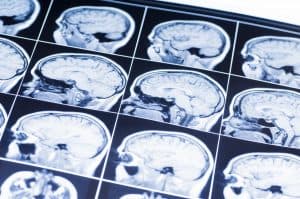Traumatic Brain Injury and Its Link to Dementia

More about the study
For their study, researchers from Umeå University in Sweden sifted through databases of groups of people from 1964 to 2012, focusing on three sets: 164,334 people with a TBI and a matching control group; 136,233 people with dementia and a matching control group; and then 46,970 pairs of siblings, one of who had a traumatic brain injury diagnosis.
Because they had such a large amount of data, spanning such a long period, the researchers were able to find a correlation between TBI and risk of dementia. Their findings included:
- The risk of a dementia diagnosis was highest the first year after a TBI—and four to six times higher than people without a TBI.
- The overall risk does decrease over time, but TBI patients still face a higher risk than those without a brain injury, even 30 years later.
- The more severe a person’s TBI, or the more TBIs suffered, the higher their risk of dementia.
- At the 15-year follow-up point, the risk for dementia increased 80% for people who had at least one TBI, in comparison to those who didn’t have any brain injury.
These findings add necessary research to the body of data that links TBIs and dementia risk, but it’s important to understand that this is an observational study. The study isn’t saying that TBIs cause dementia. It’s showing a correlation. There could be other causes. For example, maybe the onset of dementia caused a person to have the accident that resulted in the brain injury. Also, dementia is a relatively common condition, so that could be a coincidence that affected the data.
More studies would be necessary to prove a definitive cause and effect between TBIs and dementia. However, this report is noteworthy, especially for those who’ve experienced traumatic brain injuries. There is a body of research that shows cumulative hits to the head can cause more damage than previously thought, so it’s crucial that you get medical attention for any head injury, and take care to avoid another.
Tips to prevent brain injuries
You can lower the risk of or prevent head injuries by making small, but important, changes in everyday living. Always use an age-appropriate safety seat, booster, or seatbelt for your child, and ensure you always buckle up. Use a helmet when riding your motorcycle, bike, skating, playing contact sports, horseback riding, and skiing and snowboarding.
Ensure your senior citizen’s living area is safe from tripping and slipping hazards. Remove clutter, put nonslip rugs and mats in the bathroom and kitchen, and install stable handrails on the stairs. If you have young children, install window guards and use safety gates at stair openings.
If you suffered a traumatic brain injury due to the negligent or reckless behavior of someone else, the Los Angeles personal injury lawyers at Taylor & Ring, can help you find justice. We’ll fight for the compensation you’ll need for medical care, lost wages, and pain and suffering. To speak to an attorney today, call, 310.776.6390 or complete our contact form to schedule a consultation.

David Ring is a nationally renowned plaintiff’s personal injury trial attorney and has obtained multi-million dollar verdicts and settlements on behalf of seriously-injured individuals or families who have lost a loved one in a tragic accident. For more than 20 years, he has represented victims of sexual abuse, sexual harassment, assault, molestation and sexual misconduct in cases against a variety of employers and entities, including schools, churches and youth organizations.
He prides himself on providing aggressive, yet compassionate representation for children who have been sexually abused and women who have been sexually harassed or assaulted. Read more about David M. Ring.

